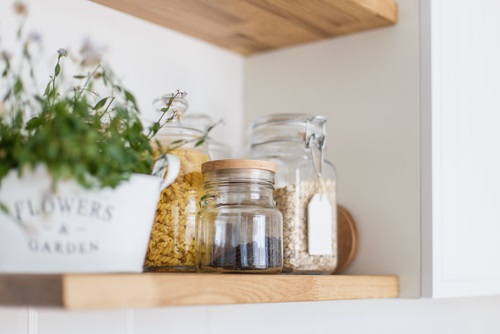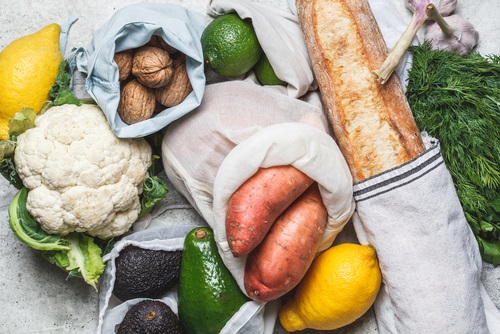Mike Hardman, from catering supplies retailer Alliance Online, shares a few simple swaps you can make to help reduce your kitchen waste.
Cruelty Free Beauty
- 4 signs you have low iron levels
- Zero Waste Beauty: Adopt a green routine with these sustainable products
- This eco-friendly beauty box is packed with refillable multi-taskers
- “I find myself using it even when I don’t need to!”
- Arctic-inspired natural skincare brand launches in the UK
- Green People launches beauty balm packaged in 100% biodegradable pot
- Lush launches same-day delivery service for its iconic handmade cosmetics
- “This cruelty-free tanning water gave me the confidence boost I needed”
- rho launches sustainable loungewear that gives back
- Rose & Caramel Raises Awareness For Women’s Self-Esteem & Mental Health With ‘I TAN FOR ME’ Campaign
- Couple launches entirely plant-based and refillable deodorant on Kickstarter
- View all
Eco Living
- Simple Hacks to Cut Your Food Waste with Gino D’Acampo
- Five Easy Ways to Reduce Food Waste
- Eat these foods to boost your mood
- Upgrade Your Cheese Toastie
- Have a healthy Christmas with these festive food swaps
- Omega-3 Health Benefits
- 5 minutes with Max La Manna
- A nutritionist’s guide to eating for healthy joints
- Easy ways to achieve your health goals
- Discover the benefits of raisins on a vegetarian diet
- Improve your gut health with California Raisins
- View all
Vegan Recipes
- Quorn Vegan Hot & Spicy Burger with Pink Slaw
- Tomato and Pumpkin Soup
- Pea and elderflower cocktail
- Matcha Coconut Ice Cream
- Vegan Lemon Bars
- Mango Salad with Thai Dressing
- Garden Gimlet
- Tofu & Green Beans Teriyaki
- Cornflakes Bombay
- Rainbow Pickle
- Soba noodles with kale and collards
- View all
Popular recipes
- Spinach and ricotta quiche vegetarian recipe
- Cheats mushroom and spinach lasagne vegetarian recipe
- Lentil bolognese vegetarian recipe
- Creamy mushroom stroganoff vegetarian recipe
- Malaysian Rendang curry vegetarian recipe
- Feta, Butternut Squash, Caramelised Onion and Cashew Nut Wellingtons
News
- Green People launches beauty balm packaged in 100% biodegradable pot
- How you can help with the Amazon wildfires
- ‘Pulled Oats’ latest plant-based protein to hit the market
- A quarter of Brits are now drinking plant-based milks
- Green Cleaning Company Bio-D Signs Up To Plastic Pact
- Omega-3 Health Benefits
- Selfridges to launch repair and resell services
- MOVING MOUNTAINS LAUNCHES PLANT-BASED MEATBALLS AND MINCE
- Big Butterfly Count calls on public to help with conservation efforts
- Eco shop launches curated box of sustainable beauty buys
- Lush drives change in cruelty-free cosmetics with £250,000 prize fund
- View all
Eco-friendly swaps to reduce your kitchen waste
4 simple changes you can implement straight away

If you’re anything like me, you’re always trying to find new ways to help lessen your impact on the environment. At the moment, the average person generates around 394kg of household waste every year, and unfortunately the majority of this ends up in landfills or an incinerator. So trying to find ways to reduce the amount of rubbish you create in the first place can really make a difference.
A large proportion of this waste is most likely produced in the kitchen, with cleaning products, plastic food packaging, and excess food all adding up. But it doesn’t have to be this way. By making a few simple swaps, you can reduce the amount of kitchen waste you create and do your part to help our planet. Here, I’ve shared four easy lifestyle changes that can make a big difference.
Swap plastic cleaning tools for wooden and biodegradable versions
Keeping our kitchens clean can often be quite a dirty process, with many everyday cleaning tools and products ending up in our household waste. For example, plastic-based dish sponges need to be replaced frequently and can’t be recycled, plus they take a long time to decompose at landfill. Dish brushes made from wood and natural fibres can be used for much longer. What’s more, when you’re finished with them, they’ll biodegrade much faster, making them a more eco-friendly choice.
You can also help to reduce the amount of waste you’re sending to landfill by opting for cleaning products in glass or eco-friendly recyclable packaging. If you want to go a step further, you could even try making your own. You can create effective multipurpose cleaners from natural ingredients like baking soda, white vinegar, lemon juice and water – just be sure to use a glass spray bottle for your homemade cleaning products.
While paper towels can be convenient for mopping up spills, they can be incredibly wasteful as they can only be used once. And, while they do eventually decompose, they may end up being incinerated if you throw them out as part of your household waste. So, you may want to consider switching to cloth versions instead. After each use, all you need to do is throw the used cloths in with your other laundry to freshen them up ready to be re-used. For an extra-environmentally friendly approach, you can even cut up your old sheets and towels to make kitchen cloths, saving you money and further reducing the amount of waste you create.

Ditch plastic wrap
Clingfilm might be quick and convenient when you need to wrap a packed lunch or cover leftovers, but it’s really not an eco-friendly choice. Because it’s so thin, plastic wrap can only be used once, plus it’s not recyclable, so it goes straight to landfill. If possible, avoid using clingfilm altogether, and start finding reusable ways to keep food fresh instead.
There are plenty of products that provide a good alternative to plastic wraps. Beeswax wraps can be used to cover single food items, whilst re-usable silicone jar and tin covers can be used to keep food in opened tins fresh and hygienic. Leftovers, salads and sandwiches can be kept in Tupperware or other seal-able containers, which can easily be cleaned and re-used. For maximum eco brownie points, try using glass or bamboo containers instead of plastic.
Avoid plastic food packaging
We all know we should be taking re-usable bags with us to the supermarket instead of buying new plastic ones every time we shop. But avoiding plastic packaging while shopping can be slightly harder, especially when so much fresh food comes already wrapped in it. In an ideal world, we’d all be shopping at zero-waste stores, but this may be difficult for some of us, particularly if you live in more rural areas where access is limited. However, it is possible to reduce the amount of plastic waste you generate when food shopping, as long as you make conscious choices and bring re-usable supplies with you.
When shopping at the supermarket, try to buy foods without any packaging. For instance, a lot of fresh produce is packaged in plastic wrap, but buying loose fruit and veg is a great way to avoid this. You can also help to further reduce waste by bringing some compostable food bags and containers or cotton mesh bags with you, and using these instead of the free plastic bags provided in the fruit and veg aisles.

Most supermarkets will also happily let you use your own wraps or containers when shopping at their cheese and deli counters, too. Another advantage of this method is that you’ll be able to buy the exact quantity of ingredients you need, which will help to make sure you’re not wasting excessive amounts of food at home.
Find plastic-free alternatives
While there are lots of ways to reduce the amount of plastic you buy at the supermarket, some essentials, like milk and bread, are almost impossible to buy without plastic packaging. However, you can get around this problem by trying to shop with small, eco-friendly local businesses wherever possible.
Old-fashioned milk delivery services will typically supply you with fresh milk in glass bottles, which can be collected and used again. You can also try and find local bakeries or artisan bread companies who are willing to sell you loaves without the plastic packaging. Farmers’ markets, trendy coffee shops, and zero-waste food shops can also be excellent places to source essentials without the dreaded plastic. And, as these products are often organic and fresh, they taste fantastic, too, plus you’ll be supporting local, independent businesses.
It’s important that we do everything we can to try and reduce the impact we’re having on the environment, and reducing your kitchen waste can be a great way to do this. Try making the easy switches and changes I’ve shared here and you’ll soon find that you’re throwing much less rubbish in your kitchen bin.
More from Vegetarian blog

We've rounded up our top tips for making the most of this British delicacy


One plus one equals more than the sum of its parts, so pair these foods together to supercharge their health benefits.

Get even more foodie inspiration from the web with our roundup of the best bloggers out there

Frying pans at the ready people, it's time to flip some pancakes...




